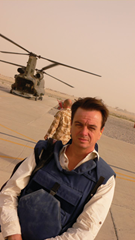John Irvine
 ITV News’ international correspondent John Irvine began his career in journalism as a junior reporter in Omagh. After growing up on the Malone Road in Belfast, he covered major events such as the Shankill Road and Remembrance Day bombs for UTV before being appointed ITV’s Ireland correspondent in 1996. His experience of covering conflict led to him reporting on stories across the Indian sub-continent, Africa and the Gulf region for ITV News.
ITV News’ international correspondent John Irvine began his career in journalism as a junior reporter in Omagh. After growing up on the Malone Road in Belfast, he covered major events such as the Shankill Road and Remembrance Day bombs for UTV before being appointed ITV’s Ireland correspondent in 1996. His experience of covering conflict led to him reporting on stories across the Indian sub-continent, Africa and the Gulf region for ITV News.
How did you start out in journalism?
My start in journalism followed an unequal struggle with the A-level examination board. As university was clearly going to be beyond me, my mum suggested becoming a reporter. I applied for a journalism course (NCTJ in Belfast), but was turned down. I did, however, manage to get onto a secretarial course. I’d been advised that shorthand and typing were essential for anyone starting out in local papers. There were to be 49 girls and me.
However just before the secretarial course started, I received another letter from the NCTJ to say I’d been accepted on the journalism course. When I arrived on the first day there were 16 students. Our tutor told us there should only have been 12 of us, but there’d been a clerical error. Fortunately being a clerical error didn’t prevent me from getting a job as a junior reporter on the Tyrone Constitution a year later. A weekly paper published in Omagh, County Tyrone, I worked there happily from 1983 until 1987, when I joined Ulster Television in Belfast.
What is your normal daily routine?
The daily routine depends on the day and the place. If I’m on base in Dubai, it usually involves watching the early news programmes at home and then going into our bureau late morning (Dubai is four hours ahead of London). There’s just myself and my cameraman in the office, so we have quite a lot of clerical work to do. We also discuss story ideas with our planning desk in London. Basically we make sure we are ready to go anywhere at the drop of a hat.
If we are on assignment, the daily routine means working as hard as you can for as long as you can to get the best possible report back to base for transmission to the views of ITV News at 6.30 and ITV News at Ten.
What has been the highlight of your career to date?
A personal highlight was covering the signing of the Good Friday Agreement at Stormont in 1998. Like many others, I had spent years covering conflict and conflict resolution in Northern Ireland, and to see our leaders agree anything was uplifting.
As a foreign correspondent, being in Baghdad during the invasion of 2003 was a real challenge. Most reporters left when President Bush issued a statement advising western journalists to do just that. On the morning of 9 April 2003, the ITV News team drove to the outskirts of the city, where we met an advancing US Marine unit. I shook hands with a staff sergeant and told him: “Welcome to Baghdad.” We claimed to be the first journalists to meet the Americans as they liberated the Iraqi capital and so far no- one has contradicted us!
Please describe the most challenging and enjoyable part of the job.
The logistics in providing television coverage of big stories in foreign lands can be a huge headache. Take earthquakes, for example. Often they happen in far flung places hard to access at the best of times. We have to get people and a mountain of equipment into places that a lot of other people are trying to leave. I have covered quakes in Turkey, India, Indonesia, Kashmir and Haiti, and they have all been immensely difficult and tiring. That said, our coverage of Haiti for example helped the aid agencies raise millions of pounds to help those affected.
How has your experience in Northern Ireland help when you were reporting internationally?
Every story I have done since leaving Belfast in 2000 has been a variation on something I did during my 17 years covering Northern Ireland. Many journalists on national news owe their careers to what they learned during the Troubles.
In your view, what are the best qualities in a journalist?
I think the qualities that matter in a journalist are compassion, determination, inquisitiveness, an ability to determine right from wrong, an ability to tell a story and a sense of humour.
How do you relax?
To relax I enjoy my family. My wife Libby is also from Belfast. She has had to tolerate a pretty hectic lifestyle that has taken us from Belfast to Jerusalem, Bangkok, Washington DC and now Dubai. We have two children, Elizabeth (15) and Peter (11). I am delighted to be able to say that they show every sign of being normal, decent human beings. I also play golf now and again.





